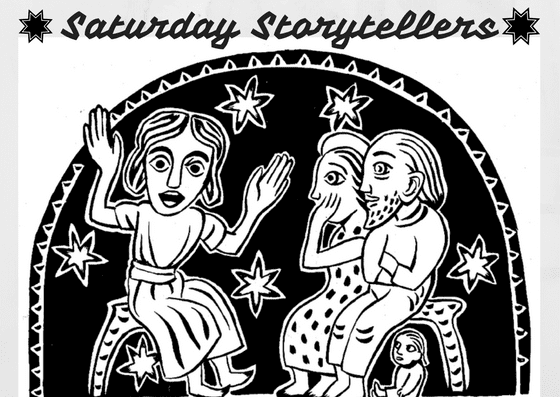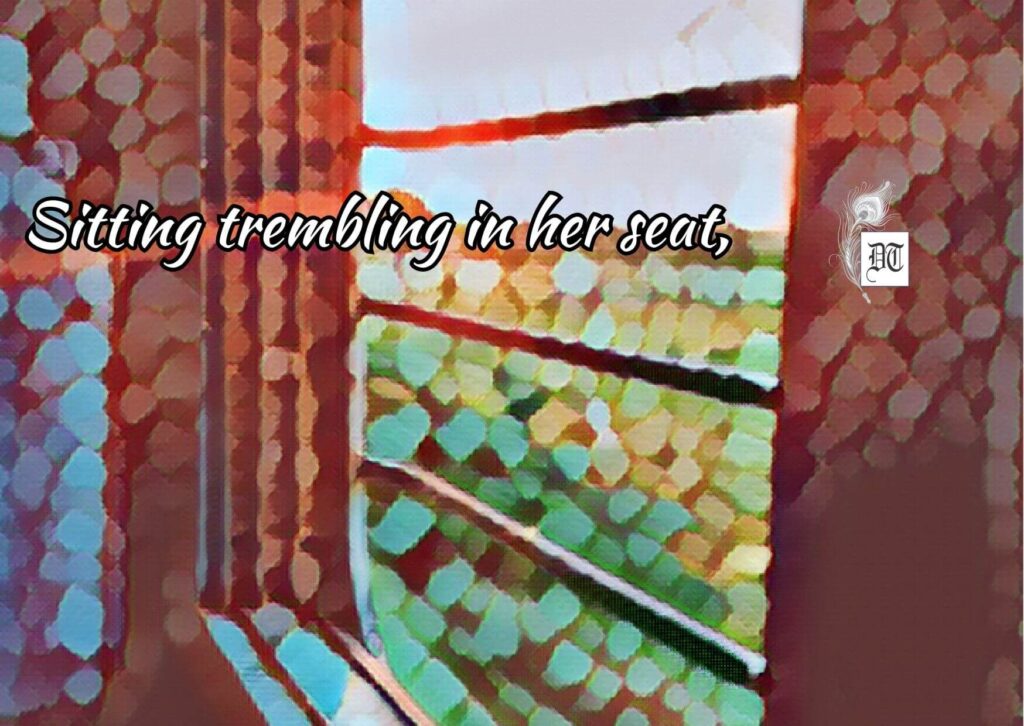Here’s a story by Sumita, about a journey, exclusively in Different Truths.

Dr. Sen’s house was in a state of excitement. His niece was bringing their grandnephews to meet them that very evening. The last time she had visited had been before her wedding more than a decade back. Mrs. Sen was on a high — deciding on the best dishes to tempt her youthful guests’ palate, preparing their best bedroom, checking the linen and many other small details. Her age and various ailments forgotten, she appeared energy personified. Dr. Sen looked at his wife’s expectant face and smiled, wishing the hours till the arrival would fly.
***
“What’s the time, Ma?”
“You asked five minutes back.”
“Well, what is the time now?”
“What do you think the time could be five minutes later? In the last half hour, this must be the tenth time one of you has asked this question. We started at 2 pm. We’ll reach at 8 pm. Stop bugging me every five minutes. Why didn’t both of you wear your watches when I reminded you?”
The two boys continued their animated play. Their arms waved and their heads nodded, they bounced up and down in their seats, swayed backward and forward as they made up and enacted a Bey-blade‘movie’ in the ether between them. “Rock Girraffa… Jinga… Rock Leon,” interspersed with jargon comprehensible only to them could be heard sporadically over the thundering racket of the local train compartment. After a short while, the discussion petered out with, “Ma, what’s the time now?” The cycle started once again.
It was a Saturday afternoon in the hot steamy month of May in Kolkata. Sealdah station and the platform had been unexpectedly sparse when Shonal and her sons boarded the local train to Raniganj, a small town in mid-western West Bengal. There were two other passengers, middle-aged worry-stained men, sitting some distance away towards the front of the compartment. They had sneaked glances at the unusual sight of a woman in jeans. A bulging rucksack on her back, a fat handbag dragging down one shoulder, she’d guided her young sons through the rear door of the carriage. The older boy had wheeled in another bag, which had been stowed under the seat. As the humid hours rolled on and the strange woman and her sons did nothing more exceptional than stay put in their seats, the novelty wore off and they faced the windows with gazes turned inwards to personal problem the men.
Shonal, while appearing nonchalant, kept a wary eye on the men.
Shonal, while appearing nonchalant, kept a wary eye on the men. She hoped a large party of women would board the compartment at one of the innumerable stations the train stopped. The brand new pepper spray, tucked within easy reach of her fingers in her tote, comforted her. She assessed the distance between their seats at the back of the carriage and the men at almost the other end and came to a reassuring conclusion.
Easing herself on the hard wooden seat, she leaned towards the boys across the aisle. “Hey, let’s listen to the train. Can you make out words in the sounds? Perhaps the train is telling us something. Listen carefully… The train seems to be reciting, well, actually shouting its tale. Shall we guess what the words are?”
“It isn’t saying anything. It’s just making noise,” Vishu giggled, his six years old face filled with glee at the ridiculous idea. Vishu was short for Vishwak, but the later name seemed destined to be used only in school.
“It’s making a lot of loud and rude noises. The vibrations are rattling my bones. Anyone with loose teeth would have them popping out of their gums by just sitting still on these benches,” groaned nine-year-old Vikram. “And the coach is swaying so much it may roll off the tracks any moment!”
“No, it won’t,” scorned Vishu, and then hesitantly, “Will it, Ma?”
“No dear, dada is joking. Come on, it will be fun,” Shonal coaxed, “There’s a strong rhythm… Don’t you feel it? Of course, it is reciting aloud poem.”
“Maybe it’s saying:
haram Dhooroom Harrumph, Engineer, you didn’t oil my joints enough. Dhichuk Dhichuk Dhantanadee, Help, my knees have arthritis
And my wheels want to escape far from me!” Vikram reeled off with a wicked air.
Vishu laughed and said, “Trains don’t have knees; maybe ankles.”
“You have been observant,” said Shonal. “I think it is saying:
Watch me go rushing, rushing, rushing, Steaming and puffing and gushing, gushing, gushing. Onwards ho, never flagging, never lagging. Hear my horn blow - bragging, bragging, bragging - Of a man-made machine that’s tirelessly chugging, chugging, chugging; Carrying people, parcels, letters and anything for the lugging, lugging, lugging. You may hear me moaning, groaning and grumbling; You may feel me shivering, shuddering and trembling; Pay no heed, that’s just my metallic body rattling and rumbling. Rocketing past towns, but through Bengal’s fertile plains keenly gliding, Absorbing God’s kind grace in the sunlit paddy ripening - Glimmering, quivering, whispering - humbling. Such a beautiful land is your country, Dear children, listen to its stories of sacrifice and bravery, Know the great souls whose deeds wrought its history. Look at the farmers, their oxen—tilling and toiling, To feed people regardless of creed and race, Waking up to face hard working days. To earn a meal for their family and eke out a few grace…”
“That’s not a poem. That’s just stuff you keep telling us,” complained Vikram.
“So they are,” laughed Shonal. “You’ve been listening after all.”
She was taking her sons on a trip across West Bengal to visit her relatives. Her aim was to acquaint the boys with her side of the family. Both her grandmothers were living, but her sons hadn’t met them yet. Apart from meeting her grandmothers, she also intended a five-day trip to Gangtok and Darjeeling, just the three of them. Disliking the restrictions of a package tour, she had researched, planned and booked the smallest detail of their itinerary over the internet. Throughout, she had worried over safety issues. Her sister, who lived in the States, had actively encouraged and bolstered her confidence. Her husband, working abroad that summer, preferring she visit her relatives on her own, had been passively compliant.
She was glad she had made this trip when she saw her grandmother and aunt again.
They had started out from Chennai where they lived, by flight to Kolkata. First stop had been her maternal grandmother’s and aunt’s apartment. It was an emotional homecoming for Shonal, for this visit had been preceded by her mother’s death from a sudden illness the previous year. A short two weeks of sickness, and she was lost to her family and friends forever, a loss that Shonal had come to terms with difficulty. She was glad she had made this trip when she saw her grandmother and aunt again. A strong resemblance existed between her grandmother and her daughters, she remembered with a smile. Her boys too had behaved impeccably, manfully accepting their tearful welcome and loving embraces.
Now, they were on their way north-westwards to visit one of Shonal’s paternal uncles. He was an anesthesiologist, content to provide his services in small towns, and Shonal admired him for it. Next, they would visit her paternal grandmother who resided with another uncle in Jalpaiguri, north Bengal. Each of these stops had cousins, whom the boys were looking forward to meeting. Jalpaiguri, nestling in green forest reserves at the foothills of the Himalayas, was a stepping stone to Gangtok and Darjeeling. Her uncle had made arrangements with a familiar taxi driver, so she could make the trip further up north with some confidence of a safety net.
This was the first time for the boys in a non-air-conditioned train, but it was Shonal who was marvelling at the difference, in fact enjoying the experience of rattling and swaying along in the overpoweringly loud compartment. She was secure in the knowledge that this was a choice that she could afford to take a more comfortable mode of travel. The boys, however, seemed lost in their imaginary world. The sights, sounds and smells around them, neither marvellous nor irritants.
She had planned the trip thinking it would be a character-building experience for the boys. They should see the countryside as she had experienced growing up. She had travelled with her sister and parents to visit their hometown, cross-country from Bangalore to Kolkata. This journey, happily, didn’t match up to the heat, crowd, and sweat, the thirty-six long hours of train travel most summer vacations had entailed.
They would reach journey’s end wrung out, covered with grime and sweat, and glittering with mica dust that blew in through the open windows of the train as it traversed the mineral-rich fields of Bihar. In those early days, Shonal’s father could afford only non AC tickets, but she and her sister had never complained, never having experienced anything better.
She pictured her parents with fondness, missing her mother with whom she had shared everything.
She pictured her parents with fondness, missing her mother with whom she had shared everything. Her father, an intellectual, kept occupied with his books these days. They had been so stoic – accepting and cheerful for the sake of their girls during those long journeys. She and her sister had entertained themselves with books, games and the changing scenes outside, she thought, unlike her boys…
“Ma, I’m hungry,” Vishu’s demand brought her back to the present.
“You just had lunch at great-grandma’s place,” she glanced at her wristwatch. “Oh, it’s almost four. I’ve got so used to the conveniences of the Express trains, I didn’t think of packing any snacks. The other trains in South India always have a constant stream of vendors too, but I don’t recall anybody passing through here. There was that plastic toy seller,” she mused. She had ignored him along with the acquisitive gleam in her boys’ eyes. “A woman had come along with a basket of cucumbers; should have bought a couple of those…”
The incessant background noise changed. They were slowing to stop at a station. She got up to peer out the door and spotted a banana seller squatting on the platform a short distance ahead. Warning her boys to sit tight, she shouldered her heavy handbag and stepped forth. She dug her purse from the depths of her bag and proffered a hundred rupees note, but the vendor didn’t have change. Sorting through her notes, she tendered the exact amount. Some tension in the air made her glance up. Her train had started moving without the warning whistle. Horror struck, she saw the compartments quietly gliding by and passengers rushing to board the moving train.
Half a dozen yellow bananas lay forgotten in the crook of her elbow. Her designer wallet shook between her cold, nerveless fingers. Her tote, a leaden weight. Her shoes were stuck where she stood. Petrified, she watched the gaping windows sliding by, and then she was seeing another moving train in another time, in another nameless little station. This one, she remembered very well, was just outside Hyderabad in Andhra Pradesh. With wide eyes, she watched a compartment filled with schoolgirls laughing, cheering, waving goodbye. “Bye Preethi, bye Preethi,” they chanted with hilarity.
Preethi had been filling her bottle at the drinking water spigot along with a few of her classmates when they had looked up, startled, to see the train moving with no warning. The teenage girls at the windows of the compartment were waving farewell to her. She was a popular girl, gentle and charming, with an infectious grin. She laughed and waved back, confident of boarding the slowly moving train.
All of them were returning from a school trip visiting Hyderabad. They had had a wonderful time exploring museums and temples and just being together, away from home and parents. They had to make a mad dash to the station for the journey back home, and a number of them hadn’t filled up on drinking water before they had to board the train. When the train stopped at an unknown station in the suburbs, a short distance from Hyderabad, some disembarked to fill their bottles along with a teacher.
For some reason, the train picked up speed while still inside the station.
When the train started moving, their teacher, Mrs. Vinodini, herded the girls back to the doorway of the compartment. Preethi was at the back of the group, but as the crowd at the entrance clambered in one by one, the cheering girls at the windows saw her hesitate and run back to the tap to collect the forgotten cap of her bottle. For some reason, the train picked up speed while still inside the station. Some of the girls shouted in concern, “Preethi, hurry up!” while a few still waved teasingly. She smiled cheerfully at them and ran back to the doorway.
Shonal was inside the train. She was one of the girls in the sleeper cubicle next to the door. She had her face pressed against the window bars to see whether Preethi got in. She was worried. The train was moving fast though they were still alongside the platform. She saw Preethi reach out for a handrail by the side of the door, the other holding her water bottle. She saw her trip, her feet entangled in one end of her trailing duppatta. She was being dragged by the train, but she was clinging on to the handrail. There were two or three people, men, running on the platform next to her, trying to lift her up, get her back on her feet, trying to help her get in.
Shonal jumped up and pulled the emergency chain. The train didn’t seem to be slowing. She hung her weight on the chain. Numb, her senses concentrated on her own cold shivering physical being, closed to any input from the outside.
When Preethi grabbed the handrail she was shocked at how fast the train was moving. Then she tripped. Fell. Couldn’t get back on her feet, they were entangled in her duppatta. Helping hands of passengers near the entrance, grabbed her from inside the compartment. They scrambled for her arms, her clothes, anything to get a grip on. There were men behind her on the platform, trying to help her. It was happening too fast. Her hand, tiring, slid down the rail. She screamed in fear, her other arm having lost the bottle at an unknown point, stretched out on the floor of the doorway trying to grasp anything to haul herself inside. Her legs slipped into the gap between the train and the platform and a howl of agony stained the air. Her legs were instantly crushed between the unyielding metal monster and the concrete platform. She wasn’t conscious; her arms slid out in a flash under the horrified gaze and clutching hands of the men who had tried to help her. She was sucked under. She knew not any more pain.
The train seemed to take an age to stop. Silence shrouded everything. Nobody was singing out farewells to Preethi. Shonal let go of the chain. Her eyes searched the empty platform.
“What happened? Where’s Preethi?” She was frantic.
“Didn’t you hear?” Rasika whispered, shell-shocked.
“Heard what?”
Tasmin sat opposite, with a sick glazed look in her eyes. Shonal was aware of being in a soundless emptiness. The faces of her two friends impinged on her mind. The others were silent ghosts.
Mrs. Vinodini stood at the foot of their sleepers. “Who was it?” her voice barely audible.
“Mam…where’s P…P…Preethi?” Shonal’s panic-stricken question was shrill in the vacuum.
Mrs. Vinodini hung her head, “No, not Preethi. Let it not be Preethi…”
They were all too dazed to even think. Yet all knew what she meant. Preethi was the best girl in class, best in academics, best behaviour wise; the sweetest, smartest girl ever. She couldn’t be lost to them like this. She was here, smiling, just moments back. A bright young talented life like hers just couldn’t be lost so easily…
Shonal found herself shaking in the bench next to her boys.
Shonal found herself shaking in the bench next to her boys. They were busy discussing the merit of one bey-blade versus another. They had been worried when the train started, and she wasn’t in the compartment with them but were satisfied as soon as they saw her walk in through the connecting passage from the other compartment.
She remembered finding the change and paying the banana seller. She remembered seeing the train moving and stuffing her wallet into her tote. She had run forward to the doorway a few yards ahead. The train hadn’t been moving fast, unlike that other train in 1987, and she had acted swiftly once she had controlled her shock.
She hadn’t been dressed in a pretty pastel churidar with a graceful deadly dangling duppatta. Her feet were clad in good running shoes with a sure grip, not pretty, ladylike, strappy sandals. Her medium length hair was tied back in a no-nonsense ponytail, not two never-ending plaits that could get entangled anywhere and wrench a head back. The only similarity was the missing warning signal…

Keeping pace with the moving carriage, she had gripped a handrail with one arm, the bananas in the other. She had stepped on the lowest step and climbed in with ease. She had to walk back to her compartment because she had run to the one ahead of her own sure she had already missed hers. She had assuaged her sons’ worried queries.
Now, she sat next to them, the fruit lying forgotten in her arms. Her boys did not appear to be hungry, and she had to urge them to take one. She wondered why she went to buy them. She recalled the terrible memory that had rushed through her mind in the last few minutes. She thought of Preethi’s parents, her little sister, hoped they had found closure. Her mind veered to Mrs. Vinodini, their physics teacher, who had a pronounced limp because of Polio or an old accident; she, who had escorted the girls to fill their water bottles. She had herded the girls back into the compartment when the train started moving. She had got into the train thinking everyone had entered ahead of her, not realising that one girl had returned to the water tank. Shonal wondered whether Mrs. Vinodini had found closure. She wondered whether the two other people, apart from her, who had pulled the emergency chain in vain that afternoon and all the other girls in that ninth standard batch, witnesses to that horrific accident, had flashbacks when they travelled by train. She wondered whether the unknown men at the doorway, who had failed despite all efforts to help Preethi, had been able to forget. She wondered whether the men working the engine that day had forgiven themselves…
She looked at her boys and took in their self-absorption. Her thoughts catapulted over a precipice – “What if?” What if that incident had recurred? What if she had been left behind or had died? What would her boys have done? Had she trained them to be independent? Were they smart enough to explain where they had come from, where they were going? She had been carrying her purse with all identifications. Did they have any identification, any money on them or in the other luggage? She had kept some money in the big bag under the seat, but her sons didn’t know about it. She hadn’t prepared them for an emergency. They weren’t street smart. They were dreamers who preferred imaginary worlds. They were her babies. They would have been lost.
Shonal felt shattered. She wondered how she would complete this journey started with such enthusiasm. Sitting trembling in her seat, she felt incapable of movement at the thought of what could have happened. She had planned the journey with such good intentions and had considered herself prepared for any eventuality, but she hadn’t been ready for this. She had buried the incident from her past somewhere deep in her soul and hadn’t thought about it until faced with a similar situation. Well, she remembered now. She remembered that accidents could and did happen anytime. She may prepare and expect trouble from one quarter but just as easily be blindsided. She should she stop her journey…Return home, and keep her children safe within her protective embrace,
A banshee scream of furious wind rose over the loud clatter and clang of the train.
A banshee scream of furious wind rose over the loud clatter and clang of the train. Fat drops of rainwater blew in through the open windows and roused them from their seats. The boys laughing, a little scared by the shattering noise and the force of the wind that was driving rain into the compartment, turned to gauge her reaction. She laughed too, called it a new adventure and bid them shut as many windows as they could, while she tried to close the thick door of the compartment in the face of the storm. Rain and a heavy runoff from the roof, swept in by the wind, splashed in through the doorway, spattering their seats and making the jerking floor slippery. It was imperative to shut the door. Her fellow passengers were wrestling with the windows and door at the other end of the compartment. Her shoulder to the door, she struggled against the squall, well aware of the dangers of the wet floor, the violently rocking compartment and her own body leaning outwards, pushing against the wind… Then for a moment, a lull dropped. She slammed the heavy door and slipped the catch.
Taking a relieved breath, she took stock. Her sons had managed to shut the windows near their seats, and the men had handled most of the others. Some windows were broken and wouldn’t close; in a couple, there were no shutters at all and wind and rain continued to rush in, but they were safe and dry where they sat. The fragrance of wet earth was refreshing and far more welcome than the metallic, dusty odour of the compartment. Night had fallen sometime back, and it was pitch-black outside. Most disconcerting was the noise. A bullet like heavy raindrops peppered the roof and sides of the metal box they were travelling in. Combined with the screeching wind and clamour of the train, the decibels reached ear-splitting proportions.
The boys huddled on either side of her, subdued by the noise and perhaps sensing her fears. She hoped the rain would let up by the time they reached Raniganj. If it didn’t, she wasn’t sure how they’d manage. She hadn’t thought to bring along an umbrella, and how would she decipher the names of the stations in this deluge? The train, at that moment, seemed to be hurtling forward with its tail on fire. When it did stop at stations it was for a minute or two. What if they missed their stop? Why, oh why had she brought her sons on this trip? They were so young.
***
Dr. Sen’s car jerked to a halt. Accompanied by his son, Rohan, he rushed into the station. They were late. The train had already gone, and the two platforms, illuminated poorly by a few scattered pockets of bluish-white lights, were deserted.
Where was his niece? Where were the kids? He and Rohan had been trying to contact her cell phone over the last half hour, to warn her they’d be late. The sudden rainstorm had caused slushy roads and slow-moving traffic.
Their calls wouldn’t go through. Which wasn’t unexpected as she was on a moving train, a signal would be weak. But where was she now? She should have been waiting on the opposite platform where the train stopped. The way out was via the overhead walkway, down to their platform, and then the exit. She wouldn’t be able to traverse that with the kids and luggage.
Arms akimbo, Rohan stood, his gaze searching the shadows but not a single soul could be seen anywhere in that small station. Dr. Sen felt frantic. The tube light above their heads seemed to have a particularly violent tic and flickered in tandem with his wild misgivings. His phone rang and both jumped.
“Where are you Kaka?” her voice calm, self-assured.
“We are inside the station, darling where are you?”
“We are just outside the station Kaka, on the left, near the autos.”
Father and son rushed out and sure enough, she was there, standing tall with a rucksack on her back, a large carryall at her feet, her handbag resting on top. The two boys in busy conversation, hummed next to her. They greeted each other with joy and laughter, hugs and pats and many exclamations. They had missed seeing her in their hurry earlier, or they just hadn’t recognised this stalwart appearance of hers in the patchy street light. She appeared strong and capable. Why had they worried? He listened to her, and all his doubts about her proclaimed trip to Gangtok and Darjeeling evaporated. She was a woman determined to live life to the fullest, to face every challenge in her path. She wouldn’t get lost.
Picture design Anumita Roy, Different Truths
#Fiction #Story #ShortStory #Darjeeling #Journey #DifferentTruths





 By
By

 By
By
 By
By